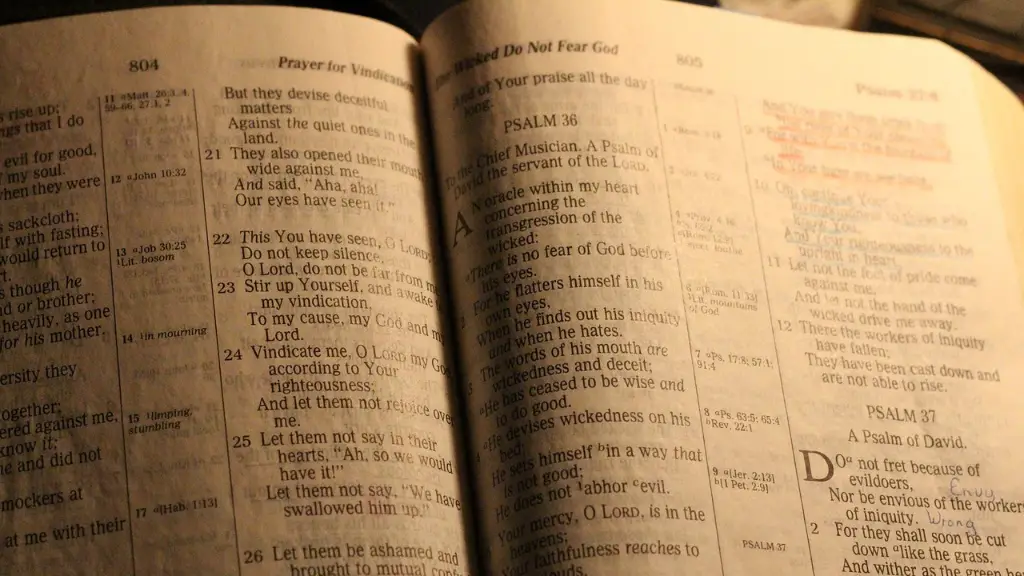The Bible is filled with a wide range of stories, teachings, and moral lessons that many people rely on for guidance and moral direction in their lives. But, when it comes to addressing the issue of homosexuality, there is much controversy and uncertainty. In particular, many people would like to know: Where does the Bible address the idea of homosexuality?
Biblical passages regarding homosexuality can be found in both the Old and New Testaments. In Exodus 20: 14 of the Old Testament, it says “you shall not commit adultery”. In addition, Leviticus 18: 22 and 20: 13 both speak of homosexuals being an “abomination”. The New Testament also has several verses that could be interpreted to be referring to homosexuality including Matthew 5: 28 which mentions “sexual immorality”.
Still, some question the relevance of these passages. Many Christians believe homosexuality is an immoral behavior and the passages mentioned are meant to reflect the same. However, others point out that the Bible never actually mentions the word ‘homosexuality’ and that it would be wrong to take these verses to be specific to the modern definition of homosexuality as a sexual orientation.
To gain a better understanding of these biblical verses it’s important to consider the context in which they were written. For example, much of the Old Testament is based on a strict sexual code meant to keep the ancient Israelites from taking part in various sexual activities deemed sinful. These activities could range from adultery and rape to pagan-influenced fertility rituals.
Experts in religion, history and sexuality suggest a variety of explanations as to why homosexuality is not addressed more directly in the Bible. It could be that the term ‘homosexuality’ didn’t yet exist in the language of the time. Or, it could be that because homosexuality was not a standard part of ancient culture, it simply wasn’t addressed. Some people also believe that homosexuality is much more complex than the ancient authors ever could have imagined and thus they failed to consider the deeper implications.
Regardless of the interpretation of these passages, it’s undeniable that their implications have had a tremendous impact on religious communities, with some churches refusing to bless same-sex unions and setting stiff rules for its members who are openly gay or lesbian. It’s clear that more education and dialogue are needed on this issue.
Historical Context
The question of where in the Bible homosexuality is addressed goes back thousands of years to a much different time. Western culture was much different than today, and homosexuality was not openly talked about or accepted. Therefore, it is much harder to accurately assess the meaning of the biblical verses referencing homosexuality. This is especially true when we consider that the term “homosexuality” was only added to the English language in 1895.
However, what is clear is that these passages appear to carry a strongly negative attitude towards homosexuality, leading many to believe that it was an unapproved sexual behavior. Still, some suggest that homosexuality could have been mentioned in the Bible in much more nuanced ways, even though the explicit passages need to be more carefully examined before drawing any conclusions.
At the same time, it is important to note that homosexuality was not even close to being the only issue addressed in the Bible. There are many other topics that are considered much more taboo, including sexual activities that are not explicitly defined as being homosexual in nature.
Today, the term “homosexuality” is generally accepted by many major religions, with some even abandoning the passages in the Bible that speak against it, such as the mentioned Leviticus verses. Through careful interpretation and understanding, we are seeing a much more accepting religious community today, but the jury is still out on if accepting homosexuality is a major part of the Bible.
Cultural Attitudes and Reactions
The debate about homosexuality in the Bible stirs up a wide range of reactions from religious communities. In some cases, people may view the passages that speak against it as outdated and no longer relevant to today’s society. Others may still strictly adhere to the passages, citing them as evidence that homosexuality is sinful and wrong. Whether or not the Bible speaks against homosexuality and in what context will vary depending on one’s interpretation of the text.
To properly address this issue, it’s important to consider both the cultural and religious perspectives on homosexuality. While some communities may come to different conclusions, it is also possible to find common ground and understand that it is up to each person to make their own decision.
In the United States and many other countries, laws and attitudes concerning homosexuality are changing rapidly and it’s important to be aware of and understand the cultural differences. For example, many religions still view homosexuality as immoral behavior, while advocates for gay rights stress that it is important to look at the issue through a more understanding and compassionate lens.
In the end, it’s up to each person to make their own decision about where the Bible addresses homosexuality and whether or not these passages are relevant to their own beliefs and morals. What one finds in the scriptures is ultimately up to them.
Morals vs. Laws
When examining the question of where in the Bible homosexuality is addressed, it is also important to differentiate between morals and laws. In some cases, the Bible may not directly address homosexuality but instead refers to laws that must be followed in order to maintain membership in a religious community.
For example, some interpretations of Leviticus state that all sex outside of marriage is categorically sinful and for members of the church to remain in the church and be in good standing, this sin must be confessed and repentance done. While homosexuality is never directly addressed here, the underlying message is clear in terms of what is and isn’t acceptable behavior.
Others argue that there is no scriptural basis for the belief that all sex outside of marriage is wrong and that this attitude may be more of a cultural construct than what is actually prescribed in the Bible. It is important to note that social and cultural attitudes towards homosexuality were very different thousands of years ago than they are today and what may have been seen as sinful in that time may not be seen in the same light now.
Religion and Homosexuality
When discussing the topic of where in the Bible homosexuality is addressed, it is important to consider how it impacts the contemporary religious community. Many churches and religions still consider homosexuality to be a sin and use biblical passages to support this belief.
Recently, however, there has been increasing acceptance of homosexuality among some religious groups, while others have begun to question their strict enforcement of biblical rules on homosexuality. Increasingly, religious institutes are taking more inclusive stances on the issue and many churches even now perform blessings for same-sex couples.
The debate between religious morality and legal justice for those who identify as LGBTQ+ will continue. Ultimately, we should strive for understanding and acceptance of all people, regardless of our faith or beliefs.
Implications of Religion
It is clear that religion and its texts still have major implications on the way people view and treat those who identify with any kind of sexuality other than heterosexuality. The laws and policies of countries, both in the West and developing countries, reflect this bias.
Recently, the topic of LGBTQ+ rights has come to the forefront in many countries and it is been met with varying levels of acceptance and even opposition. The question of the role of religion in shaping these views must also be addressed. As long as authoritative religious texts like the Bible continue to condemn homosexuality, it can be difficult to establish a culture of acceptance and understanding.
What is needed is a more nuanced approach towards interpreting the Bible and other religious texts. To make an informed decision, one must not just distinguish between cultural attitudes and beliefs, but also consider different interpretations and historical contexts.
Ultimately, it is the individual’s decision to make about how the Bible addresses homosexuality. Some may agree that it does, while others may disagree. What is certain is that the debate over the interpretation of the Bible and how it impacts people’s views on this issue is far from over.





